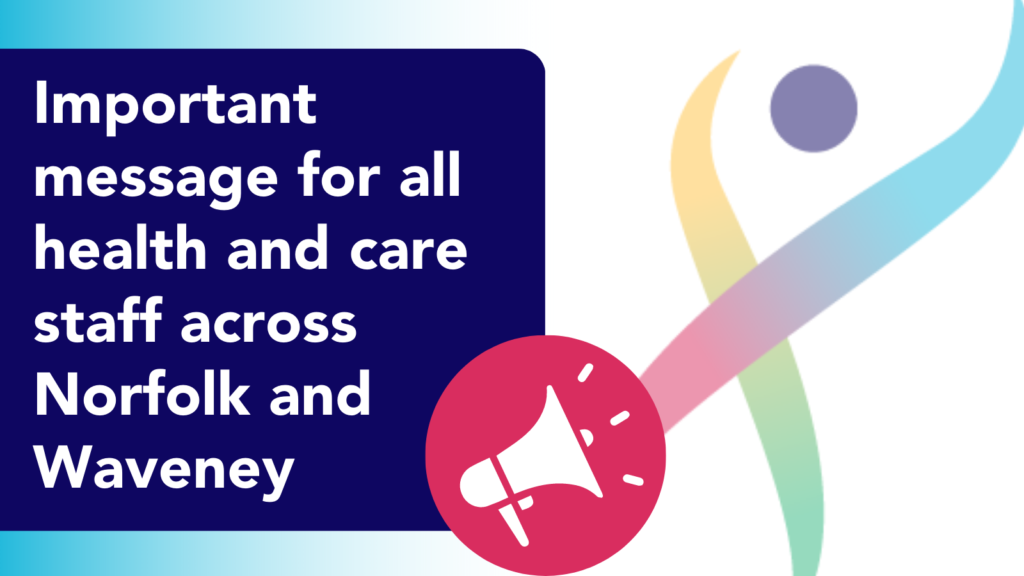Dear colleagues,
As a system we are experiencing unprecedented pressures and we know that everyone is working under very difficult circumstances and at times, in ways that we would not normally ask of you. Thank you for demonstrating such care, compassion and professionalism, while we are all working so hard.
We recognise that the current situation is really challenging. Our system in Norfolk and Waveney remains in a Critical Incident level 2 which comes as a result of high demand on services, and pressures on staffing levels.
Respiratory illnesses are on the rise, with Group A Strep as well as flu and COVID-19 all significantly impacting on staffing levels, as well as hugely adding to the demand in general practice, NHS 111 and hospital provision. We would encourage staff to take up their flu and COVID-19 booster as soon as possible.
Although we are not directly affected by industrial action in Norfolk and Waveney, our staff have faced the same circumstances that have triggered this elsewhere, and this inevitably is putting even more pressure on us.
So, there are two areas that we would like to specifically raise with you.
Firstly, we know that hospital admission is not without risk. Indeed, spending prolonged periods in hospital beyond when it is clinically necessary can seriously impact patient outcomes, leading to hospital acquired infections, falls and other harms such as deconditioning, known to further prolong length of stay and potentially reduce long term independence. So, please ensure that all decisions to admit a patient are made only after a senior review, specifically to balance the risk of hospital admission versus ongoing care at home, perhaps supported by one of our virtual wards, or community teams.
Secondly, please prioritise discharge. We would encourage you all to think ‘why not home’, and ‘why not today’ for every patient. We need to balance the risk to the individual patient of coming to harm because they have stayed in hospital longer than they needed to against the risk that things might not be absolutely perfect at home: perhaps because a care package will start tomorrow not today, or because you might prefer to see just one more set of results before discharging them.
We want to acknowledge that we are at times working with fewer staff than we would like, with more patients or with higher acuity than we usually do, and that some staff will be working outside of their usual area of practice. We also recognise that in some situations, professionals may need to depart from established procedures to care for people in these highly challenging but time-bound circumstances.
We understand that you may feel anxious about how the consequences of difficult decisions made in challenging circumstances may affect you and your staff, particularly if ultimately, there is a poor outcome. Professional bodies, unions and regulators are aware of these concerns and are providing information to reassure members that any complaints will be considered carefully taking into consideration the context and specific circumstances that occurred under these current conditions.
Home really is the best place for people to be after they have recovered from the most acute phase of their illness. Please know that you have the support of your Medical Director and Chief Nurse in making these difficult decisions. We must also listen to and respect the wishes of the patients we are treating, and this may mean difficult conversations with family members at times, for example if the patient is clinically well enough to be discharged, has capacity to decide and wants to leave, but family members are concerned “just in case” things go wrong. No discharge can be 100% safe, just as no admission can be. It is vital we weigh up these risks and accept that a small number of people will re-attend but this should not deter us from striving to get people home as soon as it is safer to do that than it is to keep them in.
We also need to balance the risk to other patients waiting in our emergency departments, being cared for in escalation beds or worse still, in our communities waiting for an ambulance if we are unable to free up space in our acute, community and mental health hospitals for them. So, we want to be clear that you have our full support when working to maintain safety at both an individual patient and whole system level.
Finally, we continue to be amazed and enormously grateful for your continued focus, drive and commitment to providing care for people who need it the most. Whatever your role, wherever you work, your ongoing commitment is and will always be recognised. Our work, together, will always be valued by patients and the communities we serve.
With best wishes and continued thanks.
Helen Blanchard, Chief Nurse, QEHKL
Dr Govindan Raghuraman, Acting Medical Director, QEHKL
Prof Nancy Fontaine, Chief Nurse, NNUH
Prof Erika Denton, Medical Director, NNUH
Paul Morris, Chief Nurse JPUH
Dr Vivek Chitre, Chief Medical Officer, JPUH
Diane Hull, Chief Nurse, NSFT
Dr Alex Lewis, Interim Chief Medical Officer, NSFT
Carolyn Fowler, Director of Nursing & Quality, NCH&C
Dr Venu Harilal, Medical Director, NCH&C
Paul Benton, Director of Quality, ECCH
Dr Frankie Swords, Medical Director Norfolk and Waveney ICS
Patricia D’Orsi, Director of Nursing Norfolk & Waveney ICS

